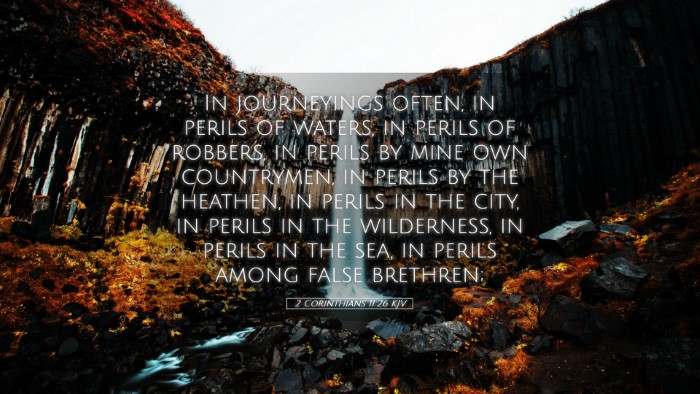Commentary on 2 Corinthians 11:26
Verse Summary: In 2 Corinthians 11:26, the Apostle Paul recounts various perils he faced in his ministry, illustrating the hardships endured for the sake of the Gospel. He states, "In journeys often, in perils of waters, in perils of robbers, in perils by my own countrymen, in perils by the Gentiles, in perils in the city, in perils in the wilderness, in perils in the sea, in perils among false brethren."
Historical Context
Matthew Henry's Commentary: The context of Paul's letter to the Corinthians reveals a response to accusations against his apostolic authority. It is imperative for the reader to understand the significance of the trials Paul faced, which validate his ministry. The Apostle emphasizes that these sufferings were not hindrances but affirmations of his commitment to Christ.
Albert Barnes' Notes: The historical backdrop includes Paul's extensive missionary journeys, marked by numerous threats and challenges. His experiences serve both as a testament to his faith and a contrast to the false apostles misleading the Corinthian church.
Exegesis of "In Journeys Often"
Adam Clarke's Commentary: Paul’s frequent travels point to his dedication to spreading the Gospel. Each journey reflected risks, but they were integral to fulfilling his divine calling. Clarke notes that these travels were not for personal gain but driven by a sincere desire to reach both Jews and Gentiles.
Perils Enumerated
- Perils of Waters: Paul faced danger on the seas, highlighting the risks of maritime travel in ancient times.
- Perils of Robbers: The threat of banditry was common in the regions he traversed, especially on isolated routes.
- Perils by My Own Countrymen: His own people often rejected him, signifying deep spiritual and emotional suffering.
- Perils by the Gentiles: Paul, a former Pharisee, experienced opposition not only from religious circles but also from Gentile disdain.
Urban and Rural Challenges
Matthew Henry: The dangers Paul faced in both city and wilderness illustrate the breadth of his mission. Each location brought unique challenges, whether it was the oppression of urban authorities or the isolation faced in rural areas.
Spiritual Implications
Albert Barnes: Paul’s narrative invites theological reflection. The trials endured served to refine his faith and deepen his reliance on Christ. His experiences resonate with the theme of suffering for the Gospel, encouraging believers to stand firm in trials.
Perils Among False Brethren
Adam Clarke: The mention of false brethren concludes Paul's litany of perils, emphasizing the internal threats that can arise within the church community. This warns readers about the importance of discernment within the Christian fellowship.
Conclusion
Summarizing Insights: Paul’s reflections provide crucial lessons for both ministry and personal faith. The array of threats he faced crystallizes his determination and underscores the cost of discipleship. For pastors and theologians, Paul's sufferings compel a deeper appreciation for the gospel's transformative power and a recognition of the struggles that accompany faithful ministry.
In meditating on these insights, believers are challenged to reflect on their own journeys. Will they endure and persevere through adversity as Paul did? This passage serves as both an encouragement and a warning about the realities of the Christian life.


